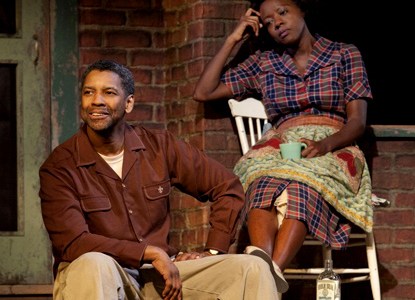
Samuel French is proud to support the August Wilson Monologue Competition, which was created by Kenny Leon and True Colors Theater Company in 2007 to carry on the legacy of August Wilson through the next generation of theatre artists. In 2017, the Dallas Competition expanded to include essays written about Mr. Wilson’s work.
In the play “Fences” by August Wilson, Troy wants to be one of the first African American people to control a garbage truck rather than just pick up the cans. Troy has always had the dream of one day becoming a professional baseball player, but those dreams were all taken away because of racism. When Cory lets Troy know that he’s planning to go to college under a scholarship to play football, Troy’s plan is to insist that it’s better for him to study and find a good stable job. All Troy is trying to do is prevent his son from being hurt by racism the way he was.
On December 1, 1955, in Montgomery, Alabama, Rosa Parks refused to give up her seat on a bus that was transporting her home. Her actions of not giving up her seat to a white passenger surprised everyone. Rosa Parks not giving up her seat began developing during the civil rights movement. Many communities wanted to stand up for her and decided to riot in support of Rosa Parks. Racism was the main cause of her not standing up; she wanted to be treated equally. Parks wanted everyone to be treated equally, no matter their race.
Leading toward those actions, in 1963 in Birmingham, Alabama, Martin Luther King was in control of a peaceful showing that white policemen countered with police dogs and fire hoses, which was in newspaper and television headlines throughout the world during that time and drew attention and support for civil right, which was in newspaper headlines throughout the world during that time. Many protestors were attracted Washington, D.C., where King delivered his famous “I have a dream” speech in which he imagined a world where people were no longer divided by race and most importantly by skin color.
Also in 1955, an African American woman, Mamie Till, who was a hard-working mother, sent her 14-year-old son Emmett to visit family members in Mississippi. On August 24, when Emmett and several of his friends went to a small town that was deeply segregated, they decided to whistle at a white woman when entering a grocery store. Four days later on August 28, Emmett was kidnapped from his uncle’s house. He was beaten and badly wounded by a gunshot to the head. Three days later after that horrible event, Emmett’s body was found floating in the Tallahatchie River. Pictures of Emmett’s deformed body appeared everywhere in African American newspapers and magazines across the country, building support for racial reform in the South. On September 23, 1955, less than a month after Emmett’s body was found, an all-white jury acquitted the husband and brother-in-law of the accuser of Emmett, which later led to much more racial justice.
Racism has always been a huge barrier between different ethnicities. Certain white communities believe they are better than black communities. Therefore, there have been many incidents where African Americans have been targeted by white people unfairly. A number of white people used to believe that they couldn’t share public transportation or public restrooms with people of a different race because society believed that whites were superior to Blacks. White people believed it was correct to pursue horrifying punishments against the people who would perform the same actions as them. In the instances of Emmett visiting the small town and Rosa Parks sitting in the front seat of public transportation, white people believed that their rights were being violated. Many people in today’s society still have the same mentality. Skin color shouldn’t be a barrier or a way to dehumanize another human being. We are all granted the same characteristic of being human.
Most of these events correlate to the play by how Troy knows reality and what’s best for his own son. Racism is going around and affecting people’s future actions. Cory’s dreams were destroyed indirectly by the racism going around the country in the 1950s and 1960s. Toward the end of the play, Troy got what he always wanted, to be a garbage truck driver. After a couple of months, he realized that his promotion did not meet his expectations. In his new position he wasn’t able to socialize or express himself to his friends. Troy claimed that he was very bored and it just wasn’t the same without his friends. Racism led to him not liking his promotion and Cory’s dream being destroyed. Cory’s dream of becoming a professional football player was crushed by his dad (who was affected by racism) because he did not want his son to experience the same rejection.
To purchase a copy of August Wilson’s Fences, click here, and to learn more about licensing a production, click here.

Comedy Mysteries: Gasps, Laughs and Thrills

A Children’s Theatre Classic: An Interview with Snow White And The Seven Dwarfs Composer Michael Valenti

